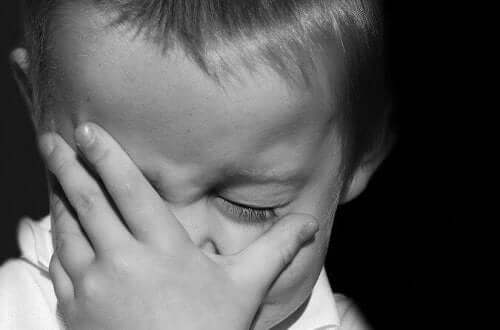The Symptoms of Emotional Deprivation During Childhood

The issue of emotional deprivation during childhood is difficult to deal with, as not every parent is in a position to accept that their child may be suffering from it. Similarly, if a child doesn’t have enough love and attention, they may not have someone to notice the symptoms they’re presenting regarding this problem.
At the same time, if the little one lacks affection, it’s perhaps because their parents haven’t done very well in this area. However, it’s possible that there’s a certain degree of ignorance about it, and that’s why parenthood has focused on nurturing the child and meeting their basic needs.
This situation is worrisome, especially because it affects a determining emotional factor in the future behavior of the child. In other words, a child who lacked love and understanding in their first stage of life is a potential adult with emotional imbalance. And this is a problem that’s not easily overcome.
The main features of emotional deprivation during childhood
Emotional deprivation during childhood can be evidenced in many ways because it’s not only that parents don’t give enough love to their child–they may not be in a position to do so. Perhaps they’re very busy and therefore neglect their work as parents. Or maybe they received the same kind of upbringing, so they don’t think it’s a problem.
In many cases, the family was structured by parents who also suffered from this deficiency, have behavioral problems, or have some emotional imbalance. On the other hand, they may be loving parents, but don’t have enough time to spend with their children. Therefore, they show their love by buying toys and creating entertainment spaces for children.

Consequently, the same need for affection can present itself in different social contexts and diverse family groups. But the result is always the same: Children who feel abandoned and unprotected, which is a form of abuse.
In general, a child who suffers from this problem is highly sensitive, something that they develop through their continuous search for affection. It’s possible that any small gesture will be perceived by the little one.
It’s common for some families to consider that the care and attention to their children are based on feeding them and covering their expenses. Therefore, they don’t worry about giving them love. For this reason, even due to ignorance of the subject or due to little emotional ability, it’s necessary for mothers and fathers to listen to the signs of lack of affection that their children emit. In this regard, as it’s your obligation to help them, it’s important that you focus on committing your time to providing your child with the care they need.
What are the symptoms of emotional deprivation?
The main feeling that invades a child devoid of affection is fear and abandonment because the little one isn’t aware of what’s happening. They only feel that they’re not loved and perceive a certain rejection. Therefore, a child whose only support is their parents feels that they’re alone in the world when these figures don’t take him or her into account.

Although each child may react differently to this problem, the universal symptoms are oriented towards fear and insecurity. In any case, it’s important to be aware of the following signs.
- Fear of being alone and other fears related to abandonment
- Problems derived from inattention
- Anxiety
- Language development disorders
- Lack of ability to relate socially
- Violent behavior changes
- Inability to express their feelings correctly
- Uncontrollable violent attitude
- Emotional sensitivity
- Lack of trust in almost everyone
- Insecurity, shyness, and low self-esteem
Affection is essential
It’s important to reflect on the possibility that, inadvertently, we’re causing this problem for our children. It’s not always easy to recognize our mistakes, but we’re human and it’s wise to rectify them; especially when our children’s emotional well-being is at stake.
Sometimes we may judge them for their shyness or aggressiveness, but we don’t stop to look for the cause. In order for a child to grow up healthy, in addition to food and other basic care, they also need affection; hugging your child, kissing them, and saying affectionate words is something that will benefit them enormously.
The issue of emotional deprivation during childhood is difficult to deal with, as not every parent is in a position to accept that their child may be suffering from it. Similarly, if a child doesn’t have enough love and attention, they may not have someone to notice the symptoms they’re presenting regarding this problem.
At the same time, if the little one lacks affection, it’s perhaps because their parents haven’t done very well in this area. However, it’s possible that there’s a certain degree of ignorance about it, and that’s why parenthood has focused on nurturing the child and meeting their basic needs.
This situation is worrisome, especially because it affects a determining emotional factor in the future behavior of the child. In other words, a child who lacked love and understanding in their first stage of life is a potential adult with emotional imbalance. And this is a problem that’s not easily overcome.
The main features of emotional deprivation during childhood
Emotional deprivation during childhood can be evidenced in many ways because it’s not only that parents don’t give enough love to their child–they may not be in a position to do so. Perhaps they’re very busy and therefore neglect their work as parents. Or maybe they received the same kind of upbringing, so they don’t think it’s a problem.
In many cases, the family was structured by parents who also suffered from this deficiency, have behavioral problems, or have some emotional imbalance. On the other hand, they may be loving parents, but don’t have enough time to spend with their children. Therefore, they show their love by buying toys and creating entertainment spaces for children.

Consequently, the same need for affection can present itself in different social contexts and diverse family groups. But the result is always the same: Children who feel abandoned and unprotected, which is a form of abuse.
In general, a child who suffers from this problem is highly sensitive, something that they develop through their continuous search for affection. It’s possible that any small gesture will be perceived by the little one.
It’s common for some families to consider that the care and attention to their children are based on feeding them and covering their expenses. Therefore, they don’t worry about giving them love. For this reason, even due to ignorance of the subject or due to little emotional ability, it’s necessary for mothers and fathers to listen to the signs of lack of affection that their children emit. In this regard, as it’s your obligation to help them, it’s important that you focus on committing your time to providing your child with the care they need.
What are the symptoms of emotional deprivation?
The main feeling that invades a child devoid of affection is fear and abandonment because the little one isn’t aware of what’s happening. They only feel that they’re not loved and perceive a certain rejection. Therefore, a child whose only support is their parents feels that they’re alone in the world when these figures don’t take him or her into account.

Although each child may react differently to this problem, the universal symptoms are oriented towards fear and insecurity. In any case, it’s important to be aware of the following signs.
- Fear of being alone and other fears related to abandonment
- Problems derived from inattention
- Anxiety
- Language development disorders
- Lack of ability to relate socially
- Violent behavior changes
- Inability to express their feelings correctly
- Uncontrollable violent attitude
- Emotional sensitivity
- Lack of trust in almost everyone
- Insecurity, shyness, and low self-esteem
Affection is essential
It’s important to reflect on the possibility that, inadvertently, we’re causing this problem for our children. It’s not always easy to recognize our mistakes, but we’re human and it’s wise to rectify them; especially when our children’s emotional well-being is at stake.
Sometimes we may judge them for their shyness or aggressiveness, but we don’t stop to look for the cause. In order for a child to grow up healthy, in addition to food and other basic care, they also need affection; hugging your child, kissing them, and saying affectionate words is something that will benefit them enormously.
All cited sources were thoroughly reviewed by our team to ensure their quality, reliability, currency, and validity. The bibliography of this article was considered reliable and of academic or scientific accuracy.
- Sabater, V. (2018, marzo 31). Carencia afectiva, cuando nos faltan nutrientes emocionales. Recuperado mayo de 2020, de https://lamenteesmaravillosa.com/carencia-afectiva-cuando-nos-faltan-nutrientes-emocionales/
- Sánchez, E. (2020, mayo 5). Síndrome de carencia afectiva ¿qué es? Recuperado mayo de 2020, de https://lamenteesmaravillosa.com/sindrome-de-carencia-afectiva-que-es/
This text is provided for informational purposes only and does not replace consultation with a professional. If in doubt, consult your specialist.








